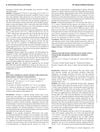 25 citations,
August 2014 in “Endocrinology”
25 citations,
August 2014 in “Endocrinology” Researchers created a mouse model of a type of rickets that does not cause hair loss.
 September 2004 in “Experimental dermatology”
September 2004 in “Experimental dermatology” Melatonin directly affects mouse hair follicles and may influence hair growth.
 January 2025 in “Recent Patents on Anti-Cancer Drug Discovery”
January 2025 in “Recent Patents on Anti-Cancer Drug Discovery” The treatment showed high response rates and was well-tolerated, potentially extending patient survival.
1 citations,
January 2019 in “Indian journal of paediatric dermatology” Kids with alopecia areata had lower vitamin D levels than healthy kids.
 2 citations,
January 2022 in “Genetics Research”
2 citations,
January 2022 in “Genetics Research” Using hemocoagulase with platelet-rich plasma in hip replacement can lessen blood loss and improve healing and blood clotting.
 December 2022 in “Türk biyokimya dergisi”
December 2022 in “Türk biyokimya dergisi” The conclusions are: fecal short-chain fatty acids may help prevent cancer, fiber intake can reduce obesity, weight loss is hard for obese people, low BMI cancer patients are more prone to chemotherapy side effects, intermittent fasting benefits gut health, cherry laurel has health benefits in rats, certain gene variations can increase stress in hair loss patients, fecal acids can affect blood sugar levels, cold agglutinin can affect blood test results in autoimmune patients, and people with Crohn's disease have higher levels of a certain chemical in their blood.
 66 citations,
January 2001 in “Vitamins and hormones”
66 citations,
January 2001 in “Vitamins and hormones” Androgen receptors are key for development and health, affecting conditions like prostate cancer and male pattern baldness.
 489 citations,
November 2021 in “Signal Transduction and Targeted Therapy”
489 citations,
November 2021 in “Signal Transduction and Targeted Therapy” The JAK/STAT pathway is important in cell processes and disease, and JAK inhibitors are promising for treating related conditions.
75 citations,
March 2018 in “Molecules/Molecules online/Molecules annual” L-Cysteine may have health benefits, but its effectiveness is still debated due to limited clinical trial data.
 April 2023 in “The journal of investigative dermatology/Journal of investigative dermatology”
April 2023 in “The journal of investigative dermatology/Journal of investigative dermatology” Melanocytes are cells that make skin and hair color and help protect skin from sun damage.
2 citations,
May 2023 in “Frontiers in Pharmacology” Natural products may help treat skin inflammation from abnormal adrenal hormones.
 14 citations,
July 2021 in “Reviews in endocrine and metabolic disorders”
14 citations,
July 2021 in “Reviews in endocrine and metabolic disorders” SARS-CoV-2, the virus causing COVID-19, can affect all endocrine organs and systems, altering their function and potentially leading to disorders. Factors like diabetes and obesity increase infection risk and severity. Understanding these effects is key for effective treatment.
 December 2018 in “The Journal of medical research”
December 2018 in “The Journal of medical research” The Consciousness Energy Healing Treatment significantly increased human dermal papilla cell growth, suggesting it may help with hair growth and skin disorders.
August 2018 in “Jundishapur journal of natural pharmaceutical products” Transfollicular drug delivery can improve medication absorption through hair follicles.
 September 2016 in “Princeton University Press eBooks”
September 2016 in “Princeton University Press eBooks” The document concludes that understanding health requires considering evolutionary perspectives on reproductive fitness, and recognizing the complexity of factors like diet, testosterone, and sexual orientation.
 1 citations,
November 2023 in “Journal of neurology”
1 citations,
November 2023 in “Journal of neurology” A patient with a nerve disorder died from infection complications after developing insulin resistance from a treatment.
 December 2024 in “Nutrients”
December 2024 in “Nutrients” Skin, hair, and nail changes can help detect eating disorders early.
 1 citations,
April 2018 in “SLEEP”
1 citations,
April 2018 in “SLEEP” People with obstructive sleep apnea are more likely to get herpes zoster, but nightmares don't affect the risk.
181 citations,
December 2017 in “Trends in immunology” Intestinal intraepithelial lymphocytes are crucial for gut immunity and maintaining the mucosal barrier.
 67 citations,
May 2018 in “Journal of Ginseng Research”
67 citations,
May 2018 in “Journal of Ginseng Research” Red ginseng may improve immunity, fatigue, memory, blood circulation, and menopausal symptoms, and is generally safe to consume.
 2 citations,
September 2021
2 citations,
September 2021 Patients with alopecia areata may have lower vitamin D levels than healthy people.
 7 citations,
August 2022 in “Experimental dermatology”
7 citations,
August 2022 in “Experimental dermatology” Blocking YAP/TAZ could be a new way to treat skin cancer.
 15 citations,
January 2013 in “European Journal of Pediatrics”
15 citations,
January 2013 in “European Journal of Pediatrics” Patients with Shwachman-Diamond syndrome often get misdiagnosed due to a wide range of symptoms, including immune system problems and bone abnormalities.
 253 citations,
April 2014 in “Drugs”
253 citations,
April 2014 in “Drugs” Teriflunomide helps reduce multiple sclerosis symptoms and is safe for most patients.
 September 2009 in “Dermato-endocrinology”
September 2009 in “Dermato-endocrinology” Good nutrition and vitamins are important for healthy skin and can prevent diseases.
 31 citations,
April 2007 in “Experimental Dermatology”
31 citations,
April 2007 in “Experimental Dermatology” Stress in mice delays hair growth and treatments blocking substance P can partly reverse this effect.
April 2024 in “Biomolecules” Exosomal miRNAs from stem cells can help improve skin health and delay aging.
September 1989 in “Neuroscience letters” People need different amounts of biotin based on age, and not getting enough can cause health problems.
 69 citations,
August 1999 in “Developmental biology”
69 citations,
August 1999 in “Developmental biology” The nude gene causes skin cell overgrowth and improper development, leading to hair and urinary issues.
 29 citations,
December 2012 in “Fibrogenesis & Tissue Repair”
29 citations,
December 2012 in “Fibrogenesis & Tissue Repair” Adult stem cells are important for tissue repair and have therapeutic potential, but more research is needed to fully use them.























